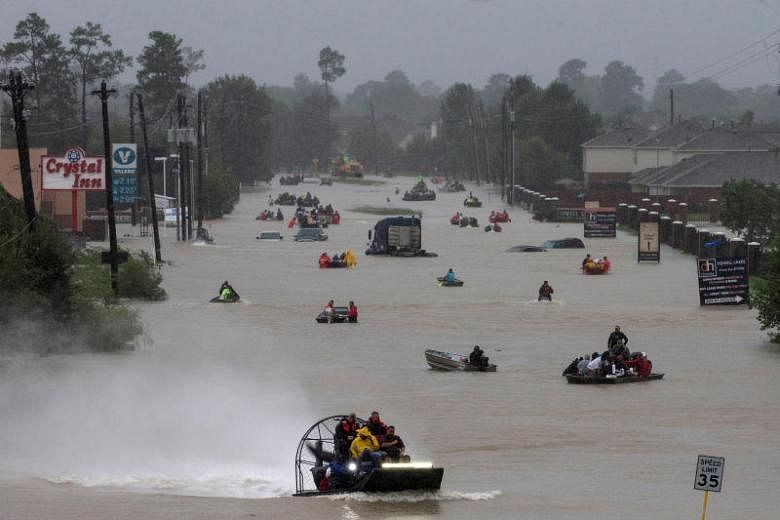WASHINGTON (BLOOMBERG) - With floodwaters still rising and damage estimates piling up, analysts expect just a modest dent in the US economy from Hurricane Harvey this quarter, with reconstruction efforts likely to be substantial enough to boost growth later this year.
In a Bloomberg survey of 17 economists conducted on Monday and Tuesday, respondents estimated the storm will lower the third quarter's annualized pace of gross domestic product expansion by 0.2 percentage point, according to the median projection. Rebuilding would then give growth a bump in the fourth quarter by the same amount, they estimated. A broader survey prior to the storm estimated a growth pace of 2.5 per cent for the third quarter and 2.4 per cent from October through December.
The responses fit with wider research on natural disasters over several decades in multiple countries, showing a relatively neutral impact over time. Short-term economic damage is typically small on a national basis and often matched by a subsequent burst in GDP, especially in large developed countries with robust emergency response systems and higher levels of private insurance.
"A long-term view then typically shows no impact on trend GDP," said Lynn Reaser, chief economist at Point Loma Nazarene University's Fermanian Business & Economic Institute in San Diego.
Damage estimates from the disaster range from US$43 billion to US$100 billion, with the number of people affected by the flooding - either needing shelter or possibly qualifying for flood federal assistance - totaling nearly a half-million.
American businesses "tend to be among the best insured throughout the world, and that's a big reason why US regional economies, on average, respond better and more quickly to natural disasters than in other countries," said Thomas Fullerton, an economics professor at the University of Texas at El Paso.
Fullerton cautioned that there is a scenario in which the downdraft on the national economy can persist.
"If instead of just capital-stock damage there is large-scale capital-stock destruction, that could really impact the national economy," he said.
In the survey, respondents tended to play down speculation that the sudden demand for labour in repairing and rebuilding the metropolitan Houston area will have a meaningful upward impact on wage inflation nationally, even in what is a tight labour market. Unemployment in the US stood at 4.3 per cent in July, matching a low for the last 16 years. That was also the same level as the jobless rate in Texas last month, according to Bureau of Labor Statistics data.
Brett Ryan, US economist at Deutsche Bank Securities in New York, said he had studied wage data following other catastrophic storms in the US, including Hurricane Katrina in 2005 and Superstorm Sandy in 2012.
"I don't see anything there for construction and utilities wages," Ryan said. "So, I'm a little suspect of that notion that a tight labour market is going to be a catalyst here for a pickup in wages in certain sectors."
Not that Hurricane Harvey comes without its complications on the national economic stage. Federal Reserve officials, in particular, will have to contend with the fallout from the storm as they examine economic reports over the next several months and try to determine which way the overall economy is headed.
"We're going to get this period where the data - industrial production, employment, GDP - is going to be volatile," Ryan said. "Trying to discern what is one-off, event-related and what is a new trend is difficult."

